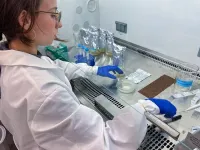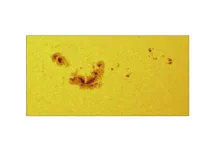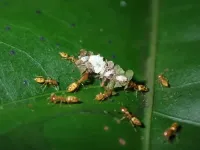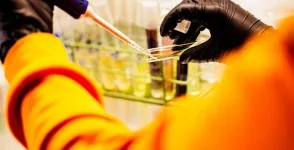(Press-News.org) DALLAS, July 18, 2024 — Diet-related diseases account for 1 in 5 deaths around the world[1] and unsustainable industrial agricultural practices threaten to compromise the health of the planet.[2] While emerging science expands our knowledge of food composition, society still understands little about the tens of thousands of components found in food.
The American Heart Association is facilitating a new research fellowship program from the Periodic Table of Food Initiative (PTFI) with support from The Rockefeller Foundation. The program, called Good Food Fellows, aims to train a new generation of scientists to significantly expand our collective understanding of food. By contributing research findings to the PTFI’s global database, the fellowships will help revolutionize agriculture and nutrition worldwide.
The Good Food Fellows program supports graduate students and early career researchers in low- and middle-income countries with research training and grants focused on the study of food quality. The first cohort, comprised of 38 fellows, will generate and apply data on food biomolecules to advance understanding of urgent human and planetary health challenges.
The Good Food Fellows program is a core offering of Food EDU, an open-access platform that provides online courses, global case studies and other educational and professional development opportunities for scientists, policymakers and food and health practitioners around the world. Food EDU’s inaugural course track, Foodomics & Society, expands on the science of food composition by highlighting the broad spectrum of biomolecules in food. Specifically, the course addresses food biomolecular connections to food systems, human nutrition, agricultural practices, climate and dietary guidelines.
Both the Good Food Fellows program and Food EDU were established to support the work of the PTFI — a global effort to map the biomolecular composition of the world’s vast edible biodiversity using standardized analytical methods based on advanced omics technologies. The pioneering offerings of the initiative allow stakeholders to characterize known and unknown components in food coupled with food system attributes.
Grants were awarded to six Periodic Table of Food Initiative Centers of Excellence, academic institutions selected to generate comprehensive food composition data that will train the next generation of global scientists working at the intersection of foodomics, agriculture, nutrition and health. The program’s first grantees are universities and institutes of public health in Colombia, Ethiopia, Fiji, Ghana, Mexico and Thailand:
Javeriana University (Colombia)
Ethiopian Public Health Institute (Ethiopia)
The University of the South Pacific (Fiji)
Kwame Nkrumah University of Science and Technology (Ghana)
National Institute of Medical Sciences and Nutrition Salvador Zubirán (Mexico)
Mahidol University (Thailand)
Over a two-year period, each Center is funding six or seven fellows, primarily master’s or doctoral students, as well as early career researchers. The Good Food Fellows program includes training on different omics platforms, which analyze multiple types of biological data, such as lipids, fibers and specialized metabolites, to provide a comprehensive understanding of food composition. In addition, the program will include training on community-engaged research and science communication, which are accompanied by formal mentorships, networking opportunities and an engagement platform.
The fellows’ specific research projects include the nutritional and medicinal value of underutilized food crops, the effects of climate change on crops, community knowledge and spiritual attachment to foods, nutrients in commonly consumed foods, the metabolism of bioactive compounds in local foods and eating habits related to diabetes risk.
“The entire world is facing a daunting challenge: to revolutionize agriculture and food into an enterprise that is both supportive of human health and sustainable for the planet,” said J. Bruce German, Ph.D., American Heart Association volunteer and member of the Food EDU curriculum advisory committee, the Periodic Table of Food Initiative science advisory committee and director of the Foods for Health Institute at the University of California, Davis. “The Periodic Table of Food Initiative and Food EDU will now provide young scientists from around the world with the food data and training they need to meet that challenge.”
"We started the Good Food Fellows program as an incubator to build capacity, with food at the center of workforce development. Key to our vision is building the capacity to translate knowledge to inform decision-making,” said Selena Ahmed, PhD, MSc, dean of Food EDU and global director of the Periodic Table of Food Initiative at the American Heart Association. “We see the Good Food Fellows program as a vehicle for food systems transformation to better support people and the planet."
“This is an exciting opportunity to learn and share experiences related to food and food culture through different contexts, and in this case different continents,” said Warangkana (Nadine) Srichamnong, program director of the Center of Excellence in Asia at Mahidol University. “Projects selected by Good Food Fellows will help us to understand the effect of food processing, farm management and crop variety on food composition.”
Food EDU is jointly facilitated by the American Heart Association and the Alliance of Bioversity & CIAT (International Center for Tropical Agriculture) as co-secretariats of the PTFI. Food EDU and Good Food Fellows are supported by The Rockefeller Foundation.
The American Heart Association, celebrating 100 years of lifesaving service in 2024, has funded more than $5.4 billion in cardiovascular, cerebrovascular and brain health research since 1949. New knowledge resulting from this funding benefits millions of lives in every corner of the U.S. and around the world.
The Association receives funding primarily from individuals; foundations and corporations (including pharmaceutical, device manufacturers and other companies) also make donations and fund specific Association programs and events. The Association has strict policies to prevent these relationships from influencing the science content. Revenues from pharmaceutical and biotech companies, device manufacturers and health insurance providers and the Association’s overall financial information are available here.
Additional Resources
Good Food Fellows Booklet
AHA news release: Targeted scientific research projects to demonstrate effectiveness of ‘food is medicine’ in health care
AHA News: New scientific resources map food components to improve human and environmental health
Follow AHA/ASA news on Twitter @HeartNews
###
About the American Heart Association
The American Heart Association is a relentless force for a world of longer, healthier lives. We are dedicated to ensuring equitable health in all communities. Through collaboration with numerous organizations, and powered by millions of volunteers, we fund innovative research, advocate for the public’s health and share lifesaving resources. The Dallas-based organization has been a leading source of health information for a century. During 2024 - our Centennial year - we celebrate our rich 100-year history and accomplishments. As we forge ahead into our second century of bold discovery and impact our vision is to advance health and hope for everyone, everywhere. Connect with us on heart.org, Facebook, X or by calling 1-800-AHA-USA1.
About Periodic Table of Food Initiative
The Periodic Table of Food Initiative (PTFI) is a global effort to create a public database of the biochemical composition and function of the food we eat using state-of-the-art mass spectrometry technologies and bioinformatics. The Initiative is supported by The Rockefeller Foundation and its public charity, RF Catalytic Capital, Inc., the Foundation for Food & Agriculture Research and the Seerave Foundation and facilitated by the American Heart Association and the Alliance of Bioversity and CIAT (International Center for Tropical Agriculture).
[1] GBD 2017 Disease and Injury Incidence and Prevalence Collaborators. Global, regional, and national incidence, prevalence, and years lived with disability for 354 diseases and injuries for 195 countries and territories, 1990-2017: a systematic analysis for the global burden of disease study 2017. Lancet. (2018) 392:1789–858. doi: 10.1016/S0140-6736(18)32279-7
[2] GBD 2017 Disease and Injury Incidence and Prevalence Collaborators. Global, regional, and national incidence, prevalence, and years lived with disability for 354 diseases and injuries for 195 countries and territories, 1990-2017: a systematic analysis for the global burden of disease study 2017. Lancet. (2018) 392:1789–858. doi: 10.1016/S0140-6736(18)32279-7
END
Food research fellowships funded for scientists in 6 countries
38 graduate students and researchers to elevate the importance of food quality to improve human and environmental health
2024-07-19
ELSE PRESS RELEASES FROM THIS DATE:
Illinois studies explore converting wastewater to fertilizer with fungal treatment
2024-07-19
URBANA, Ill. – Creating fertilizers from organic waste can help reduce the consumption of fossil fuels and promote sustainable production. One way of doing this is through hydrothermal liquefaction (HTL), which converts biomass into biocrude oil through a high-temperature, high-pressure process. Two studies from the University of Illinois Urbana-Champaign explore the use of a fungal treatment to convert the leftover wastewater into fertilizer for agricultural crops.
“HTL uses wet biomass from organic sources such as swine manure or food waste. The process yields wastewater, called hydrothermal liquefaction aqueous phase (HTL-AP), which is usually discarded. We ...
Time-lapse imaging for embryo selection in IVF does not improve the odds of live birth compared with conventional methods, according to largest study of its kind
2024-07-19
There is no difference in live birth rates between time-lapse imaging and other standard approaches used in in-vitro fertilisation (IVF) for embryo incubation and selection prior to implantation, according to the results of the largest trial of its kind.
The randomised controlled trial looked at IVF outcomes in the UK and Hong Kong. The results, published today in The Lancet, provide much-needed evidence that using time-lapse imaging (TLI) does not improve treatment outcomes for someone undergoing fertility treatment.
Time-lapse imaging is a technique ...
Early riser! The Sun is already starting its next solar cycle – despite being halfway through its current one
2024-07-19
Early riser! The Sun is already starting its next solar cycle – despite being halfway through its current one
Royal Astronomical Society press release
RAS PR 24/21 (NAM 7)
Embargoed until 00:01 BST on Friday 19 July 2024
The first rumblings of the Sun's next 11-year solar cycle have been detected in sound waves inside our home star – even though it is only halfway through its current one.
This existing cycle is now at its peak, or 'solar maximum' - which is when the Sun’s magnetic field flips and its poles swap places - until mid-2025.
It affects ...
Oakland hospital building is approved for construction
2024-07-19
Subscribe to UCSF News
Note to Editors: Photos and renderings are available in our Media Kit
UC Regents sign off on $1.5 billion project to construct a new hospital building at UCSF Benioff Children’s Hospital Oakland, securing the future of world-class pediatric facilities in the East Bay.
UCSF Benioff Children’s Hospitals has received final approval on a $1.49 billion hospital building on its Oakland campus that will provide a state-of-the-art, child-centered medical facility for families across the Bay Area. The proposal was approved ...
Rice’s Emilia Morosan awarded prestigious Vannevar Bush Faculty Fellowship
2024-07-18
Rice University’s Emilia Morosan has been selected as one of 11 scientists and engineers for the 2024 Vannevar Bush Faculty Fellowship (VBFF) to support her work on correlated topological materials. The fellowship is the Department of Defense’s (DoD) most prestigious single-investigator award and supports groundbreaking basic research with the potential to transform various fields.
The VBFF, a five-year fellowship with up to $3 million in funding, encourages innovative ideas where researcher creativity intersects with the unknown. Vannevar Bush Fellows represent a cadre of experts who provide invaluable direction to the DoD ...
DOE announces $52 million for small business research and development grants
2024-07-18
WASHINGTON, D.C.—In support of President Biden’s Investing in America agenda, the U.S. Department of Energy (DOE) today announced awards totaling $52 million for a broad range of small businesses in 39 states. The projects will work to solve a wide range of problems—from cybersecurity for electric vehicle charging infrastructure to new ways to detect radiation threats and new ways to manufacture lithium metal for batteries.
“Since Day One, the Biden-Harris Administration has supported small businesses, prompting record ...
Of ants and trees: ‘Evolutionary déjà’ in the tropical rainforest
2024-07-18
Ants are famous for their regimented and complex social behaviors. In the tropics, they are also famous for forming mutualisms with plants. Certain species of trees have conspicuous hollow swellings that house ants, often feeding the ants with specialized ant food. In return, the ants are pugnacious bodyguards, swarming out to aggressively defend the plant against enemies. Scientists have observed these mutualisms for centuries, but an enduring question is how these intriguing interactions evolved in the first place.
That remains a mystery, but new research led by University ...
Tumor-infiltrating lymphocyte therapy marks a milestone in cancer treatment
2024-07-18
TAMPA, Fla. — The recent U.S. Food and Drug Administration approval of lifileucel, the first commercial tumor-infiltrating lymphocyte (TIL) therapy for advanced melanoma, marks a significant breakthrough in cancer therapy. In a new commentary published in Cancer Cell, Moffitt Cancer Center scientists provide a comprehensive overview of the therapy’s development and highlight its transformative potential.
“TIL therapy represents a major advancement in personalized cancer treatment, offering new possibilities for patients with treatment-resistant cancers,” said Amod Sarnaik, M.D., ...
New research on climate change, gut health, and socioeconomic status’ impact on stroke and aneurysm care to be presented at Society of Neurointerventional Surgery’s 21st Annual Meeting
2024-07-18
FOR IMMEDIATE RELEASE: July 18, 2024
CONTACT: Camille Jewell, cjewell@vancomm.com or 202-248-5460
COLORADO SPRINGS, Colo. — Neurointerventional surgeons from across the globe will gather at the Society of NeuroInterventional Surgery’s (SNIS) 21st Annual Meeting from July 22 through July 25 in Colorado Springs, Colorado, to present novel research and innovation in their field.
The conference, held at the Broadmoor Resort, will be a hybrid event with in-person and livestreamed content. Meeting sessions will cover new topics ranging from how living in coal mining areas worsens outcomes ...
Statewide Biomedical and Clinical Research Collaborative Awards granted
2024-07-18
Researchers from the University of Tennessee Health Science Center College of Medicine-Knoxville; the University of Tennessee, Knoxville; and the University of Tennessee Health Science Center Office of Research understand the challenges affecting the health and wellness of Tennesseans. A new system-wide collaborative grant program led by UTHSC COM-K is supporting research and scholarly activities to pursue discoveries addressing health issues across Tennessee and beyond.
The program will fund six awards totaling more than $450,000 to support teams of clinicians, faculty, and researchers from across the state to innovate in the field of medicine and biomedical research.
Robert ...
LAST 30 PRESS RELEASES:
Kidney cancer study finds belzutifan plus pembrolizumab post-surgery helps patients at high risk for relapse stay cancer-free longer
Alkali cation effects in electrochemical carbon dioxide reduction
Test platforms for charging wireless cars now fit on a bench
$3 million NIH grant funds national study of Medicare Advantage’s benefit expansion into social supports
Amplified Sciences achieves CAP accreditation for cutting-edge diagnostic lab
Fred Hutch announces 12 recipients of the annual Harold M. Weintraub Graduate Student Award
Native forest litter helps rebuild soil life in post-mining landscapes
Mountain soils in arid regions may emit more greenhouse gas as climate shifts, new study finds
Pairing biochar with other soil amendments could unlock stronger gains in soil health
Why do we get a skip in our step when we’re happy? Thank dopamine
UC Irvine scientists uncover cellular mechanism behind muscle repair
Platform to map living brain noninvasively takes next big step
Stress-testing the Cascadia Subduction Zone reveals variability that could impact how earthquakes spread
We may be underestimating the true carbon cost of northern wildfires
Blood test predicts which bladder cancer patients may safely skip surgery
Kennesaw State's Vijay Anand honored as National Academy of Inventors Senior Member
Recovery from whaling reveals the role of age in Humpback reproduction
Can the canny tick help prevent disease like MS and cancer?
Newcomer children show lower rates of emergency department use for non‑urgent conditions, study finds
Cognitive and neuropsychiatric function in former American football players
From trash to climate tech: rubber gloves find new life as carbon capturers materials
A step towards needed treatments for hantaviruses in new molecular map
Boys are more motivated, while girls are more compassionate?
Study identifies opposing roles for IL6 and IL6R in long-term mortality
AI accurately spots medical disorder from privacy-conscious hand images
Transient Pauli blocking for broadband ultrafast optical switching
Political polarization can spur CO2 emissions, stymie climate action
Researchers develop new strategy for improving inverted perovskite solar cells
Yes! The role of YAP and CTGF as potential therapeutic targets for preventing severe liver disease
Pancreatic cancer may begin hiding from the immune system earlier than we thought
[Press-News.org] Food research fellowships funded for scientists in 6 countries38 graduate students and researchers to elevate the importance of food quality to improve human and environmental health




